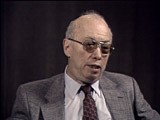
Oral History
Browse an alphabetical list of survivors’ oral histories. These interviews describe firsthand accounts and personal experiences during the Holocaust and World War II.
<< Previous | Displaying results 1-15 of 15 for "Oral History" | Next >>
-
Irena Sendler describes how she was arrested and tortured by the Gestapo
Oral HistoryIrena Sendler (1910–2008) was a member of the Council for Aid to Jews, codenamed “Żegota.” Żegota was a clandestine rescue organization of Poles and Jews in German-occupied Poland. Supported by the Polish government-in-exile, Żegota coordinated efforts to save Jews from Nazi persecution and murder. It operated from 1942 to 1945. Irena Sendler (Sendlerowa) was working as a social worker in Warsaw when World War II broke out in 1939. After the Nazis forced Warsaw’s Jews to move into the ghetto…
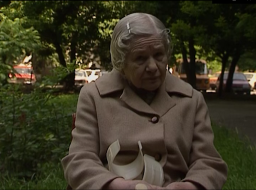
-
Irene Hizme and Rene Slotkin describe being reunited in the United States in 1950
Oral HistoryIrene and Rene were born Renate and Rene Guttmann. The family moved to Prague shortly after the twins' birth, where they were living when the Germans occupied Bohemia and Moravia in March 1939. A few months later, uniformed Germans arrested their father. Decades later, Irene and Rene learned that he was killed at the Auschwitz camp in December 1941. Irene, Rene, and their mother were deported to the Theresienstadt ghetto, and later to the Auschwitz camp. At Auschwitz, the twins were separated and subjected…
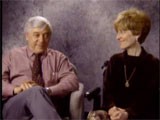
-
Irene Hizme and Rene Slotkin describe being separated from their mother upon arrival in the Auschwitz camp
Oral HistoryIrene and Rene were born Renate and Rene Guttmann. The family moved to Prague shortly after the twins' birth, where they were living when the Germans occupied Bohemia and Moravia in March 1939. A few months later, uniformed Germans arrested their father. Decades later, Irene and Rene learned that he was killed at the Auschwitz camp in December 1941. Irene, Rene, and their mother were deported to the Theresienstadt ghetto, and later to the Auschwitz camp. At Auschwitz, the twins were separated and subjected…
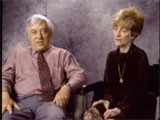
-
Irene Hizme and Rene Slotkin describe deportation to Auschwitz
Oral HistoryIrene and Rene were born Renate and Rene Guttmann. The family moved to Prague shortly after the twins' birth, where they were living when the Germans occupied Bohemia and Moravia in March 1939. A few months later, uniformed Germans arrested their father. Decades later, Irene and Rene learned that he was killed at the Auschwitz camp in December 1941. Irene, Rene, and their mother were deported to the Theresienstadt ghetto, and later to the Auschwitz camp. At Auschwitz, the twins were separated and subjected…
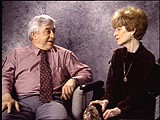
-
Irene Hizme and Rene Slotkin describe medical experiments
Oral HistoryIrene Hizme and Rene Slotkin, Jewish twins born in 1937 in Czechoslovakia, were deported with their mother to Theresienstadt, then Auschwitz. They describe the medical experiments to which they were subjected. Benno Müller-Hill, professor of genetics, University of Cologne, comments on Nazi medical experiments. Simon Rosenkier, a Polish Jew who was deported to Auschwitz-Birkenau, describes medical experiments at Auschwitz. [Photo credits: Getty Images, New York City; Yad Vashem, Jerusalem;…
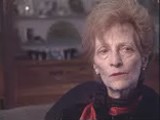
-
Irene Hizme describes being a poster child for Rescue Children
Oral HistoryIrene and Rene were born Renate and Rene Guttmann. The family moved to Prague shortly after the twins' birth, where they were living when the Germans occupied Bohemia and Moravia in March 1939. A few months later, uniformed Germans arrested their father. Decades later, Irene and Rene learned that he was killed at the Auschwitz camp in December 1941. Irene, Rene, and their mother were deported to the Theresienstadt ghetto, and later to the Auschwitz camp. At Auschwitz, the twins were separated and subjected…
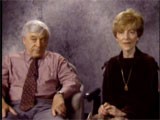
-
Irene Hizme describes life in a Catholic orphanage in postwar France
Oral HistoryIrene and her twin brother Rene were born Renate and Rene Guttmann. The family moved to Prague shortly after the twins' birth, where they were living when the Germans occupied Bohemia and Moravia in March 1939. A few months later, uniformed Germans arrested their father. Decades later, Irene and Rene learned that he was killed at the Auschwitz camp in December 1941. Irene, Rene, and their mother were deported to the Theresienstadt ghetto, and later to the Auschwitz camp. At Auschwitz, the twins were…

-
Irene Hizme describes medical experiments at Auschwitz
Oral HistoryIrene and Rene were born Renate and Rene Guttmann. The family moved to Prague shortly after the twins' birth, where they were living when the Germans occupied Bohemia and Moravia in March 1939. A few months later, uniformed Germans arrested their father. Decades later, Irene and Rene learned that he was killed at the Auschwitz camp in December 1941. Irene, Rene, and their mother were deported to the Theresienstadt ghetto, and later to the Auschwitz camp. At Auschwitz, the twins were separated and subjected…

-
Irene Weber describes how obtaining a work card could offer protection from deportation
Oral HistorySeparated from her family, Irene was deported from the Sosnowiec ghetto to the Gleiwitz camp in March 1943. After a death march and an attempted escape from a transport out of Gleiwitz, Irene was imprisoned in Prague, then Theresienstadt, where as a political prisoner she was sentenced to death by starvation. For the five months before liberation, she shared a cell with 59 ailing women. Irene was the sole member of her Jewish family to survive the war.
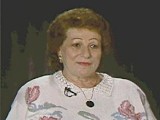
-
Isaac (Mike) Danon describes conditions in Yugoslavia and Italian occupation forces there
Oral HistoryIsaac lived with his parents and three sisters in Split, on the Dalmatian coast of Yugoslavia. When German and Axis forces invaded and partitioned Yugoslavia in 1941, Italian forces occupied Split along with other coastal areas of Yugoslavia. Italian occupation authorities in Yugoslavia generally prevented violent attacks on Jews. The Italian zone became a safe haven for those fleeing the Nazis or the Ustase (Croatian fascists). After Italy signed an armistice with the Allies in 1943, the area was occupied…

-
Isadore Helfing describes labor in the Treblinka camp
Oral HistoryIsadore was born to a Jewish family in Kielce, Poland. Germany invaded Poland in September 1939. Isadore and his family were forced into the Kielce ghetto, which was established in April 1941. When his parents were deported to the Treblinka killing center in 1942, Isadore went with them rather than remaining behind for forced labor. After arrival at the camp, Isadore hid in a pile of bodies. His parents were killed. Isadore survived by working in the camp. On August 2, 1943, prisoners at Treblinka revolted…
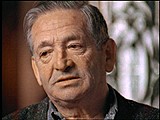
-
Israel Ipson describes forced labor to construct an airplane runway
Oral HistoryIsrael was raised in Kovno, Lithuania, and graduated from law school there in 1933. Because of anti-Jewish discrimination, he was unable to practice law. The Germans invaded the Soviet Union in June 1941, occupying Lithuania. The Kovno ghetto was established that August. By claiming to be a mechanic, Israel escaped several massacres. He was forced to work on a wooden airport runway outside the ghetto. After he escaped, Israel, his wife, and son hid in a potato pit for 9 months until liberation by Soviet…
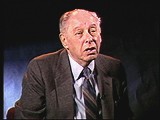
-
Ivo Herzer describes a roundup (from which he was released) of Jews by Croatian collaborators in 1941
Oral HistoryIvo grew up in a middle-class Jewish family in Zagreb. He experienced little overt antisemitism until the Germans and their allies invaded Yugoslavia in April 1941 and installed a fascist Ustasa government in Croatia. The Ustasa regime began killing Jews, Serbs, and Roma (Gypsies). Ivo's family escaped to Italian-occupied territory, where the Italians tried to protect Jewish refugees. Ivo lived in Italian internment camps, including the Rab island camp, before moving to mainland Italy in 1944. He worked…

-
Ivo Herzer describes assistance from Italian soldiers during his family's escape from Croatia
Oral HistoryIvo grew up in a middle-class Jewish family in Zagreb. He experienced little overt antisemitism until the Germans and their allies invaded Yugoslavia in April 1941 and installed a fascist Ustasa government in Croatia. The Ustasa regime began killing Jews, Serbs, and Roma (Gypsies). Ivo's family escaped to Italian-occupied territory, where the Italians tried to protect Jewish refugees. Ivo lived in Italian internment camps, including the Rab island camp, before moving to mainland Italy in 1944. He worked…
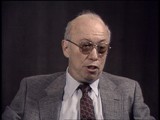
-
Ivo Herzer describes conditions in the camp in Italian-occupied Yugoslavia to which he was taken in November 1942
Oral HistoryIvo grew up in a middle-class Jewish family in Zagreb. He experienced little overt antisemitism until the Germans and their allies invaded Yugoslavia in April 1941 and installed a fascist Ustasa government in Croatia. The Ustasa regime began killing Jews, Serbs, and Roma (Gypsies). Ivo's family escaped to Italian-occupied territory, where the Italians tried to protect Jewish refugees. Ivo lived in Italian internment camps, including the Rab island camp, before moving to mainland Italy in 1944. He worked…
